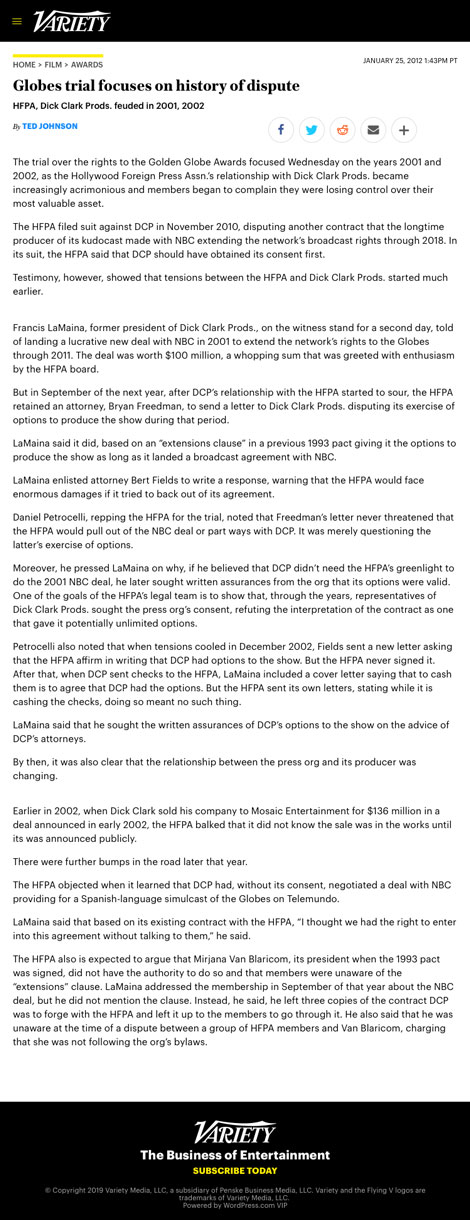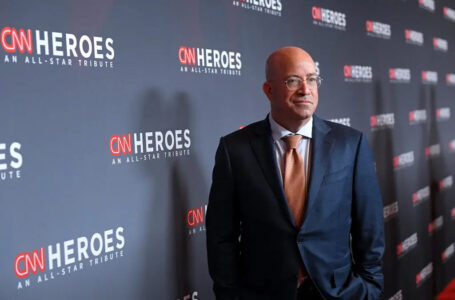HFPA, Dick Clark Prods. feuded in 2001, 2002
The trial over the rights to the Golden Globe Awards focused Wednesday on the years 2001 and 2002, as the Hollywood Foreign Press Assn.’s relationship with Dick Clark Prods. became increasingly acrimonious and members began to complain they were losing control over their most valuable asset.
The HFPA filed suit against DCP in November 2010, disputing another contract that the longtime producer of its kudocast made with NBC extending the network’s broadcast rights through 2018. In its suit, the HFPA said that DCP should have obtained its consent first.
Testimony, however, showed that tensions between the HFPA and Dick Clark Prods. started much earlier.
Francis LaMaina, former president of Dick Clark Prods., on the witness stand for a second day, told of landing a lucrative new deal with NBC in 2001 to extend the network’s rights to the Globes through 2011. The deal was worth $100 million, a whopping sum that was greeted with enthusiasm by the HFPA board.
But in September of the next year, after DCP’s relationship with the HFPA started to sour, the HFPA retained an attorney, Bryan Freedman, to send a letter to Dick Clark Prods. disputing its exercise of options to produce the show during that period.
LaMaina said it did, based on an “extensions clause” in a previous 1993 pact giving it the options to produce the show as long as it landed a broadcast agreement with NBC.
LaMaina enlisted attorney Bert Fields to write a response, warning that the HFPA would face enormous damages if it tried to back out of its agreement.
Daniel Petrocelli, repping the HFPA for the trial, noted that Freedman’s letter never threatened that the HFPA would pull out of the NBC deal or part ways with DCP. It was merely questioning the latter’s exercise of options.
Moreover, he pressed LaMaina on why, if he believed that DCP didn’t need the HFPA’s greenlight to do the 2001 NBC deal, he later sought written assurances from the org that its options were valid. One of the goals of the HFPA’s legal team is to show that, through the years, representatives of Dick Clark Prods. sought the press org’s consent, refuting the interpretation of the contract as one that gave it potentially unlimited options.
Petrocelli also noted that when tensions cooled in December 2002, Fields sent a new letter asking that the HFPA affirm in writing that DCP had options to the show. But the HFPA never signed it. After that, when DCP sent checks to the HFPA, LaMaina included a cover letter saying that to cash them is to agree that DCP had the options. But the HFPA sent its own letters, stating while it is cashing the checks, doing so meant no such thing.
LaMaina said that he sought the written assurances of DCP’s options to the show on the advice of DCP’s attorneys.
By then, it was also clear that the relationship between the press org and its producer was changing.
Earlier in 2002, when Dick Clark sold his company to Mosaic Entertainment for $136 million in a deal announced in early 2002, the HFPA balked that it did not know the sale was in the works until its was announced publicly.
There were further bumps in the road later that year.
The HFPA objected when it learned that DCP had, without its consent, negotiated a deal with NBC providing for a Spanish-language simulcast of the Globes on Telemundo.
LaMaina said that based on its existing contract with the HFPA, “I thought we had the right to enter into this agreement without talking to them,” he said.
The HFPA also is expected to argue that Mirjana Van Blaricom, its president when the 1993 pact was signed, did not have the authority to do so and that members were unaware of the “extensions” clause. LaMaina addressed the membership in September of that year about the NBC deal, but he did not mention the clause. Instead, he said, he left three copies of the contract DCP was to forge with the HFPA and left it up to the members to go through it. He also said that he was unaware at the time of a dispute between a group of HFPA members and Van Blaricom, charging that she was not following the org’s bylaws.





